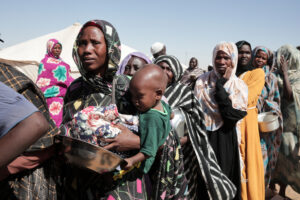Boko Haram: What Are We Doing?

Photograph by Ali Kaya/Agence France-Presse — Getty Images

Boko Haram, the Nigeria-based terrorist network, has wreaked havoc in West Africa since its reemergence in 2009. The group gained international notoriety for its kidnapping of 200 girls last spring and a series of deadly massacres in early January 2015. More than 10,000 civilians have been killed in the course of its campaigns since 2009. So why has the U.S. not intervened in Nigeria, as it has with unmanned aerial vehicle (UAV) strikes in places like Yemen, Syria, and Iraq?
It is because the United States has well-defined, vital national security interests. Although this may not seem like the case at times, many threats, such as Boko Haram, are currently not considered a vital national security interest meriting direct military action. The limited response from the U.S. so far has been to provide support to regional organizations, sending military technology – especially for border control operations – and the provision of a group of military advisors to help train Nigerian counterterrorism units.
This does not mean, however, that the group will not cross a “red line,” requiring action from the U.S. But today, the group’s targets remain local and regional: Boko Haram controls parts of northern Nigeria and frequently crosses into Cameroon to conduct attacks on border communities. There are now reports that Boko Haram is receiving weapons training and other forms of assistance from al-Qaeda in the Islamic Maghreb (AQIM). But so far, the two groups have not collaborated to conduct attacks outside of the region or against a specific U.S. target.
Yet just because the group has not specifically targeted U.S. nationals or installations overseas does not mean the group can be ignored. Right now Nigeria is an important regional partner to the U.S., both for economic reasons and for regional stability interests. What ails Nigeria afflicts the rest of West Africa. fluid borders and the inability of regional organizations to contain Boko Haram has enabled the conflict to spread into other neighboring countries, with destabilizing consequences. It is not in the interests of the U.S. for West Africa to become further destabilized or serve as a safe haven for terrorist groups.
The response from the U.S. has therefore been to provide support to regional organizations, sending military technology, especially for border control operations, and the provision of a group of military advisors to help train the Nigerian Special Forces confronting Boko Haram. It is difficult to learn of the harrowing repression created by Boko Haram, and there is a natural desire to demand action in light of the destruction caused by the group. Yet in terms of national security, Boko Haram is not yet seen as a vital threat to U.S. national security. Thus, future similar attacks and killings by Boko Haram most likely will not result in “boots on the ground,” UAV strikes, or other significant U.S. involvement for the time being.
Elizabeth Bennett, Albany, NY, is a graduate student at New York University’s Department of International Relations. In 2013 she received a B.S. in Economics from Bentley University. She specializes in U.S. national security and terrorism focusing on South Asia.




